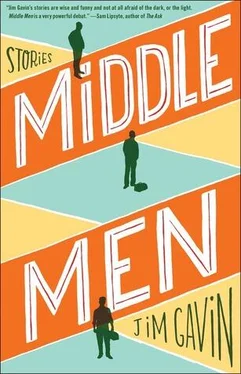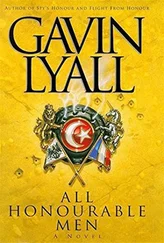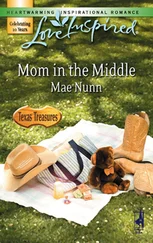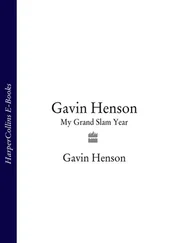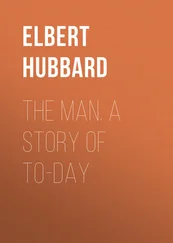Coasting down Ashby Avenue, he kept seeing colorful flags out of the corner of his eye. It was like riding past a row of embassies, but when he turned to look, the flags were gone. At the BART station, Bobby walked to the end of the platform and stood by the tunnel, bracing himself for the rush of wind. Inside the train he concentrated on the BART map, its routes marked by elementary bars of red, yellow, and blue. It kept his mind off the black watery abyss waiting above him.
He got off at Powell, emerging into cold gray twilight. In his T-shirt and damp board shorts, he thought he might freeze to death waiting for the 38 bus, so he did jumping jacks until it arrived. He sat next to the window, looking down on Geary Boulevard. At one stop, in the heart of the Tenderloin, an old drunk staggered up the steps and offered the driver a bouquet of dead transfers. The driver motioned for him to take a seat, but instead the guy walked down the aisle to the exit doors, threw his transfers in the air, and then hopped off. Bobby laughed but no one else on the bus seemed to notice the man’s performance.
The pub was in the Richmond. It was nice and warm inside and the walls were decorated with portraits of poets and rebels. He had been here a few times before with Nora, who described it as “a proper pub.” Now that she had money, Nora spent all of her vacations in Ireland, paying top dollar to recapture the glory of her family’s destitution. It was her bizarro way of establishing legitimacy, like some derelict countess tracing her bloodline to an ancient king. Bobby didn’t understand why someone who was born and raised in Southern California cared so much about a wet, miserable country she had no real connection to; but she always came back from her trips seeming refreshed, like she had gone home.
The girl tending bar looked underage. He asked if he could make a local call.
“I’ll let you dial the number,” he offered.
Her face was pale and freckled, like Nora’s, and once again Bobby wished he had shaved. She handed him the portable phone and walked down to the other end of the bar. When Nora didn’t answer her work phone, he quickly hung up and tried her cell. She didn’t answer, so he left a message:
“Hey, it’s Bobby. I hope you’re having a proactive day, adding value and so forth. I’m at the bar. I got here early. I’m going to run a tab and let you pay for it when you get here. I’ll probably need to stay at your place tonight. Also, my cell phone got turned off. And I need a new kidney. And the mob wants to kill me. And I’ve got the stigmata, again. Hurry up and get here.”
He gave back the phone and asked for a menu.
“They’re doing a pork chop tonight,” the bartender said. She had an Irish accent.
“That sounds great. I’ll start a tab.”
“I can’t run a tab without a credit card.”
“Where in Ireland are you from?”
“A small place. You’ve never heard of it.”
“I bet my cousin’s been there. You two should talk. She’ll be here soon. Do you know her? Nora Sullivan. She’s in here a lot.”
“I do know her,” she said. “She always puts ‘Fairytale of New York’ on the jukebox.”
“She said to go ahead and start a tab for her. She’s on her way.”
“I need a card.”
Bobby handed her a credit card. “This one’s expired, but just barely.”
Her face was blank, but somehow a friendly blank. She took the card and he ordered a Guinness and pork chop.
A few men in the bar were wearing suits. One gentleman, grinning warmly at the bartender as he ordered a drink, had on a paisley tie and sharp-looking vest. In this den of brass and mahogany Bobby felt a sudden kinship, and once again he wished for a hat, something he could remove in their presence as a sign of respect. He pictured himself sitting in a top-floor office, with papers spread neatly before him awaiting his signature, and he saw on the far side of the polished table, cast in silhouette against the window, a row of faceless investors, nodding silently to each other, communicating annualized return rates through some sinister form of clairvoyance. Bobby was excited to shake hands with these fragrant and shadowy men. Once they felt the rugged texture of his hand, they would instantly understand the physical and psychological advantages provided by the Man Handle, and they would have no choice but to furnish Bobby with grotesque sums of money.
His pork chop was dry, but he enjoyed it, gristle and all, and then ordered another Guinness and a basket of fries. He finished those, ordered another Guinness, and at some point John, Paul, George, and Ringo walked through the front door. Four guys wearing Beatles wigs and dark, high-button suits. They were lugging instruments. Bobby called over to the bartender and she said it was Beatles night. A bunch of cover bands were going to play.
“Why are you making concessions to the British?” he asked.
“It’s just some locals playing music.”
“Why not a U2 night?”
“Because I’d fucking gag,” she said, taking his empty glass.
In walked four Sgt. Peppers, arrayed in full Edwardian pomp.
“Who the fuck are these guys?” said Bobby, but the bartender was helping other customers. The pub was getting crowded. One of the mop-top Beatles, a short husky guy in his forties with a red, pockmarked nose, came up to the bar to order drinks. He had meaty hands and he was holding a scuffed pair of drumsticks.
“Ringo!” said Bobby, slapping him on the back.
Ringo looked startled, but then smiled.
“You guys are really going for it.”
“That’s what we do,” said Ringo. “We always go for it on the second Thursday of every month.” He tapped the brass bar rail with his sticks. “How’s your night going?”
“Me?” Bobby was taken off guard. He couldn’t remember the last time somebody had asked him a question about himself. “I’m meeting my cousin,” he said. “She’s late. It’s already nine o’clock. I’m worried she’s not coming. She’s in here all the time. Do you know her?”
Bobby described Nora and as it turned out, Ringo did know her. He pointed across the bar to the band’s John Lennon and said the poor guy had tried asking her out, without success.
“What’s Lennon’s day job?” Bobby asked.
“He doesn’t have one at the moment.”
“Then he doesn’t have a chance,” Bobby laughed. “Nora tries to slum, but she doesn’t have the heart for it. She’s going to marry somebody rich and boring.”
“I thought she was very nice when I talked to her.”
“I don’t think she’s coming.”
“That’s too bad.”
“No, no! That’s the thing. I should be in a bad mood, but I’m excited to hear you guys play.”
“Are you a big Beatles fan?”
“Can you guys play ‘Paperback Writer’?”
“We can definitely do that.”
The bartender brought over four bottles of beer and Bobby, with a gallant flourish of his hand, indicated that this round was on him.
• • •
“I hope you guys had fun at the conference. I want to hear all about it, but first a few things. Now, keep in mind, this isn’t me talking, this is everybody, and the reality is we need a backup strategy for wealth creation. From a solution standpoint, we need to execute right now, and the biggest problem I see is that we lack coordination in our pricing strategies.”
Dave Grant picked up his juggle balls. Once they were in flight, he paced back and forth in front of a window that looked down on the bright streets of SoMa. The Geneva offices were next-door to the birthplace of Jack London. A plaque commemorated the site, and whenever Nora walked past it at lunch, she liked to imagine the old waterfront, a proper sink of iniquity, crawling with proper scoundrels and proper whores. She now sat on one side of the conference table, next to Jill and the rest of the marketing team. Mike LaBrocca, head of sales, sat on the other side of the table with his team, a pack of hyenas from third-tier MBA programs who spent their days quoting Old School and refreshing ESPN.com. A star-shaped conferencing unit at the center of the table transmitted the meeting to satellite offices in Chicago and New York. These people could hear Dave, but they couldn’t watch him juggle. In spite of herself, Nora liked watching Dave juggle. It was soothing and hypnotic. He was only thirty-three years old, a wunderkind who decorated his office with memorabilia from his lacrosse days at Princeton and his stint in Guatemala with the Peace Corps. He spoke Spanish to the cleaning staff, expressing gratitude for their hard work. This made Nora want to vomit, and even more nauseating was the fact that most of the janitors seemed to genuinely like Dave, often seeking him out to say hello. They never said hello to her. Dave worked insane hours, sleeping a couple nights a week on the couch in his office, and yet somehow he made time to participate in a lot of expensive outdoor hobbies — kayaking, rock climbing, action kites. He had a nice tan and a nice family too; his wife and three boys were installed in a Noe Valley town house. One of his boys had survived leukemia, so on top of everything else, the fucker had overcome adversity and heartbreak. Another star on his résumé.
Читать дальше
